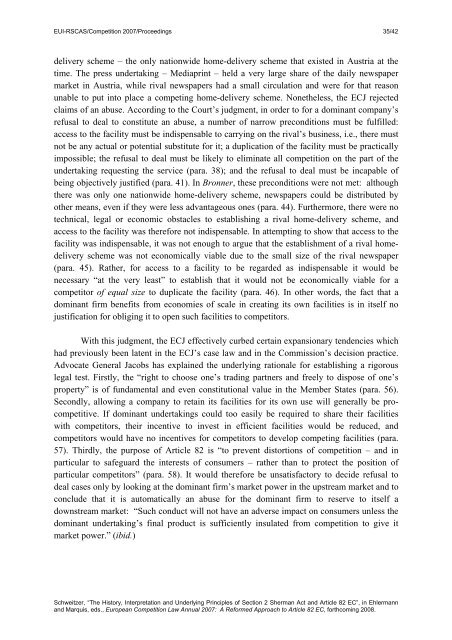The History, Interpretation and Underlying Principles of Section
The History, Interpretation and Underlying Principles of Section
The History, Interpretation and Underlying Principles of Section
Create successful ePaper yourself
Turn your PDF publications into a flip-book with our unique Google optimized e-Paper software.
EUI-RSCAS/Competition 2007/Proceedings 35/42<br />
delivery scheme – the only nationwide home-delivery scheme that existed in Austria at the<br />
time. <strong>The</strong> press undertaking – Mediaprint – held a very large share <strong>of</strong> the daily newspaper<br />
market in Austria, while rival newspapers had a small circulation <strong>and</strong> were for that reason<br />
unable to put into place a competing home-delivery scheme. Nonetheless, the ECJ rejected<br />
claims <strong>of</strong> an abuse. According to the Court’s judgment, in order to for a dominant company’s<br />
refusal to deal to constitute an abuse, a number <strong>of</strong> narrow preconditions must be fulfilled:<br />
access to the facility must be indispensable to carrying on the rival’s business, i.e., there must<br />
not be any actual or potential substitute for it; a duplication <strong>of</strong> the facility must be practically<br />
impossible; the refusal to deal must be likely to eliminate all competition on the part <strong>of</strong> the<br />
undertaking requesting the service (para. 38); <strong>and</strong> the refusal to deal must be incapable <strong>of</strong><br />
being objectively justified (para. 41). In Bronner, these preconditions were not met: although<br />
there was only one nationwide home-delivery scheme, newspapers could be distributed by<br />
other means, even if they were less advantageous ones (para. 44). Furthermore, there were no<br />
technical, legal or economic obstacles to establishing a rival home-delivery scheme, <strong>and</strong><br />
access to the facility was therefore not indispensable. In attempting to show that access to the<br />
facility was indispensable, it was not enough to argue that the establishment <strong>of</strong> a rival homedelivery<br />
scheme was not economically viable due to the small size <strong>of</strong> the rival newspaper<br />
(para. 45). Rather, for access to a facility to be regarded as indispensable it would be<br />
necessary “at the very least” to establish that it would not be economically viable for a<br />
competitor <strong>of</strong> equal size to duplicate the facility (para. 46). In other words, the fact that a<br />
dominant firm benefits from economies <strong>of</strong> scale in creating its own facilities is in itself no<br />
justification for obliging it to open such facilities to competitors.<br />
With this judgment, the ECJ effectively curbed certain expansionary tendencies which<br />
had previously been latent in the ECJ’s case law <strong>and</strong> in the Commission’s decision practice.<br />
Advocate General Jacobs has explained the underlying rationale for establishing a rigorous<br />
legal test. Firstly, the “right to choose one’s trading partners <strong>and</strong> freely to dispose <strong>of</strong> one’s<br />
property” is <strong>of</strong> fundamental <strong>and</strong> even constitutional value in the Member States (para. 56).<br />
Secondly, allowing a company to retain its facilities for its own use will generally be procompetitive.<br />
If dominant undertakings could too easily be required to share their facilities<br />
with competitors, their incentive to invest in efficient facilities would be reduced, <strong>and</strong><br />
competitors would have no incentives for competitors to develop competing facilities (para.<br />
57). Thirdly, the purpose <strong>of</strong> Article 82 is “to prevent distortions <strong>of</strong> competition – <strong>and</strong> in<br />
particular to safeguard the interests <strong>of</strong> consumers – rather than to protect the position <strong>of</strong><br />
particular competitors” (para. 58). It would therefore be unsatisfactory to decide refusal to<br />
deal cases only by looking at the dominant firm’s market power in the upstream market <strong>and</strong> to<br />
conclude that it is automatically an abuse for the dominant firm to reserve to itself a<br />
downstream market: “Such conduct will not have an adverse impact on consumers unless the<br />
dominant undertaking’s final product is sufficiently insulated from competition to give it<br />
market power.” (ibid.)<br />
Schweitzer, “<strong>The</strong> <strong>History</strong>, <strong>Interpretation</strong> <strong>and</strong> <strong>Underlying</strong> <strong>Principles</strong> <strong>of</strong> <strong>Section</strong> 2 Sherman Act <strong>and</strong> Article 82 EC”, in Ehlermann<br />
<strong>and</strong> Marquis, eds., European Competition Law Annual 2007: A Reformed Approach to Article 82 EC, forthcoming 2008.

















